The luxury boutique hotel in the heart of a cloud forest
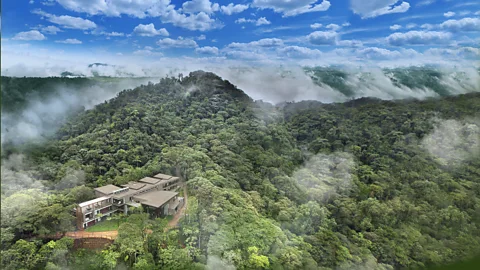 Mashpi Lodge
Mashpi LodgeWith just 2% of the Chocó Cloud Forest remaining, Ecuador's Mashpi Lodge brings a luxuriously innovative approach to its conservation by immersing guests in jungle adventures.
The morning sun filtered between the tree trunks of the dense, mist-filled Chocó Cloud Forest as I watched colourful butterflies and vibrant tanagers flutter among the branches – all from the comfort of my bed with just a glass wall separating me and the outside world. Words like "immersive" and "eco-tourism" are often overused in the travel industry, but Mashpi Lodge, a boutique hotel placed in the middle of a steamy Ecuadorian jungle, couldn't be truer of these concepts.
I had arrived in Mashpi Lodge by van the day before after making the three-hour, ear-popping descent from Quito's lofty altitude into the heart of the cloud forest. A luxury hotel isn't what you expect to see at the end of a dirt track lined with ferns the size of parasols and trees so lush and high that they block out the sun. But Mashpi is no high-rise resort. The design is contemporary and minimal with earthy tones and huge glass windows, creating a continuous harmony between building and forest.
The lodge might attract luxury travellers but it is firmly rooted in the local community, with at least 80% of the Mashpi staff coming from the surrounding region. Tourism means these communities can survive. The alternative livelihood is logging or gold mining, which are environmentally destructive and have already taken their toll on the Chocó Cloud Forest, where just 2% of its original vegetation remains.
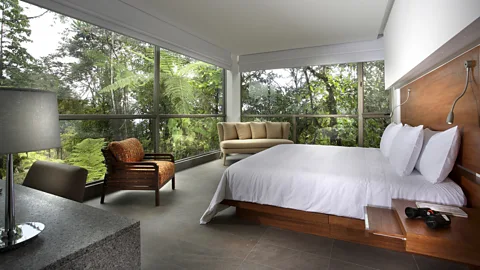 Mashpi Lodge
Mashpi LodgeIt was this depressing statistic that spurred the former mayor of Quito, Roque Sevilla, to buy a piece of land in the Chocó Cloud Forest in 2001, purely for the sake of preserving it. He continued to buy more and more, expanding his land into what is now the 6,178-acre Mashpi Reserve.
What makes Mashpi Lodge regenerative?
The entire lodge was constructed without cutting down any trees, and the materials were sourced nearby, minimising its carbon footprint.
In the past decade, ongoing research in the Mashpi Reserve has identified 16 new species, underpinning the importance of Chocó Cloud Forest conservation.
The lodge's restaurant sources most of its ingredients from within a 50km radius, supporting the livelihoods of 15 local families and helping female producers become financially independent.
Passionate about his mission to protect the cloud forest and lift Ecuadorian communities out of poverty using the power of sustainable tourism, he decided to build Mashpi Lodge in an old sawmill once used for logging.
"I'd like to see that the Mashpi guests return to their homes as passionate defenders of the conservation of these wonderful forests," he said.
Against the backdrop of murmuring wildlife and sticky tropical heat, the lodge's surroundings encourage guests to embrace their sense of adventure – which is just as well because it's these immersive jungle experiences that Sevilla hopes will make his guests fall in love with the forest. After an introductory talk peppered with facts about the Chocó Cloud Forest led by one of Mashpi's resident biologists, I joined a friendly group of visitors for our first outdoor activity of the day – Mashpi's flagship attraction, the Dragonfly Canopy Gondola, a 2km-long cable car ride above the forest.
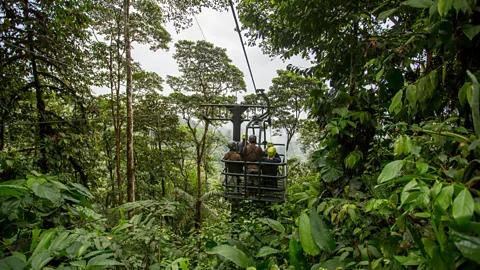 Mashpi Lodge
Mashpi LodgeSitting in the open-top metal grid cabin with just enough room for five people and dangling 200m over the forest floor while eye level with the cloud forest's treetops was less hair-raising than I expected. It was peaceful and quiet compared to the jungle's chatter down below and surprisingly calming, even for someone terrified of heights like me. The entire group fell silent as we glided across the gorge and the sweeping views of tree-covered mountains cutting through swirling mist came into sight.
As we drifted along, our guide told us about the lodge's conservation initiatives within the Mashpi Reserve, designed to protect the very ecosystem we were observing. The lodge uses "forest guardians", a set of 10 solar-panelled audio recorders dotted around the reserve, capable of detecting the rev of a chainsaw and subsequently alerting on-site rangers to this illegal activity. It also uses camera traps to monitor animals and track movement patterns, where images are analysed by researchers at Mashpi's Research Centre, a small laboratory next to the lodge.
It's here in this research centre that some of Mashpi's most important discoveries have been made. In the past decade, 16 new species have been identified in the reserve, including the endemic Mashpi magnolia, a huge tree home to dozens of epiphytic plant species that grow on its trunk, and several species of silk wasps.
"This is why it's so important to have research here as there are so many species waiting to be discovered," said Chiara Correa, Mashpi's resident biologist, who studies the reserve's wildlife and discovered a new-to-science orchid near the lodge.
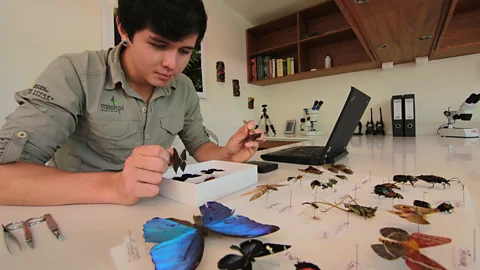 Mashpi Lodge
Mashpi LodgeThe Dragonfly Canopy Gondola is just one of the many activities designed to drop guests right into the thick of the cloud forest while learning about its fauna, flora and conservation efforts. On other expeditions, guides intrigued us with facts about butterflies and their behaviours at the lodge's Life Center, a research space and breeding hub where dozens of chrysalises hung in glass containers. We also crossed another gorge on the Sky Bike, a two-person, pedal-powered tandem that is a shorter and more energetic version of the Dragonfly Canopy Gondola, and got up-close-and-personal with dozens of hummingbirds, thanks to the nectar-filled feeders that the guides gave us.
These multiple activities are fuelled by three daily meals served in the lodge's open dining room, where two-storey-high glass walls offer views of the surrounding jungle. The menu reflects whatever is in season and is enriched with flavours collected from the forest, such as wild garlic and the chillagua herb (like coriander). A traditional Ecuadorian ceviche was so fresh I could almost taste the sea, while a rich mousse was served with chocolate cake and salak, a tangy, sweet fruit. A vegetable-heavy "mountain stew" was spread out on the plate next to fried plantain and topped with delicate edible flowers, which I enjoyed with the Mashpi cocktail, a dangerously smooth sugarcane liquor mixed with sweet pineapple.
Most of the ingredients are sourced within a 50km radius, a deliberate choice by Sevilla to minimise the lodge's carbon footprint, as is his focus on purchasing from female-owned businesses. The result is more than just a steady stream of income for Ecuadorian women. "[Before], I thought that because we are women, we cannot achieve anything," said Jazmín Albán, a local producer, adding that she now plans to expand her business by selling her products of honey and jams to a wider market.
On my final day, I joined a group night walk. Scanning the trees and floor with a headlamp, our guide Lizardo Proaño spotted animals that I would never have noticed otherwise – an opossum scurrying up a tree, a tarantula resting on a trunk and a transparent glass frog chirping on a leaf. Placing a magnifying glass under the glass frog and gently cupping it from behind, Proaño held the frog at an angle so we could see the medley of organs and tiny beating heart under its see-through skin.
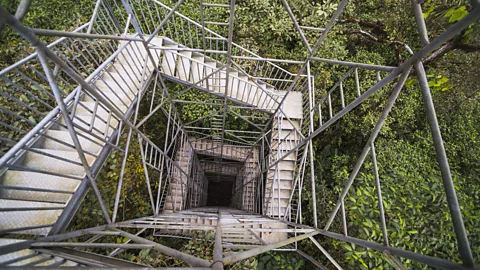 Mashpi Lodge
Mashpi LodgeIt's these unique encounters and the palpable passion from the staff for the Chocó Cloud Forest and its wildlife that make the lodge so special. Having visited rainforests across the world, I had an idea of what to expect from the Chocó Cloud Forest, but nothing could have prepared me for the ever-changing landscape of Mashpi. I loved my rainforest views every morning from my bed. But what I loved the most at the hotel was the viewing platform.
The lodge sits at the top of one of the reserve's rolling hills, with a metal viewing decking jutting out across the valley. In the morning, I would go to the platform and see the clouds roll in over the jungle landscape that stretches into the horizon. In the evening, I'd sit and watch the sky turn purple as the crickets and frogs turned their singing up several notches and the mist swirled and retreated.
"The effect is so magical, that it's difficult to find this elsewhere," said Sevilla. "We've been unable to find a place that is as special as Mashpi."
Thoughtful Travel is a BBC Travel series that helps people explore places responsibly and sustainably, all while making them better through regenerative and responsible travel.
---
If you liked this story, sign up for the weekly bbc.com features newsletter called "The Essential List". A handpicked selection of stories from BBC Future, Culture, Worklife and Travel, delivered to your inbox every Friday.
